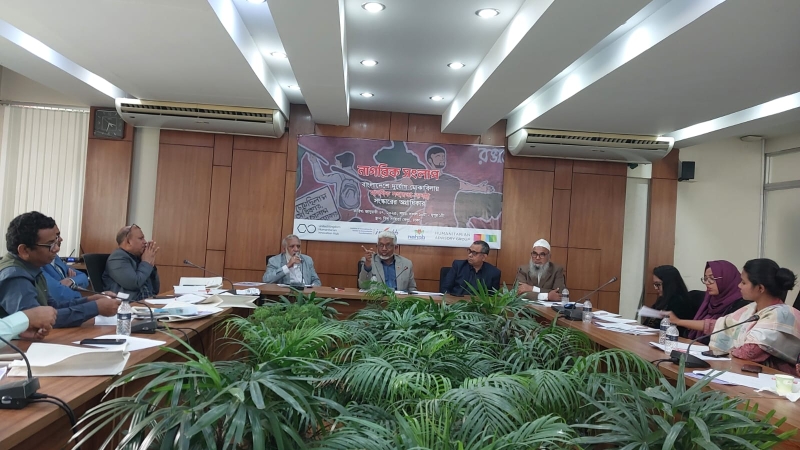- Tarique Rahman Formally Named BNP Chairman |
- 136 new drugs in 195 essential drugs list, pricing guidelines |
- BSF halts overnight road building near border as BGB intervenes |
- U.S. Pullout From Global Bodies Sparks Widespread Alarm |
Experts for disaster mgt reforms amid political shifts

Disaster
management experts have called for a significant overhaul of the country's
disaster management strategy, highlighting new opportunities created by the
shifting political environment. They emphasized that these changes should be
seized to minimize disaster risk and mitigate the impact on affected
communities. Their remarks came during a citizen dialogue at Bishwa Shahitta
Kendra in the city on Monday.
The event, titled 'Priority of Humanitarian Assistance System Reform in Bangladesh,' was jointly organized by the Insights Institute of Innovation for Gender and Humanitarian Transformation and NAHAB (National Alliance of Humanitarian Actors Bangladesh). The session was chaired by NAHAB President Md. Rafiqul Alam, and moderated by Insights and NAHAB Advisor Md. Ehsanur Rahman. Insights Advisor Suman Ahsanul Islam delivered the keynote speech.
In his address, Suman Ahsanul Islam pointed out that disaster management decisions in Bangladesh are often made by non-experts, despite the highly specialized nature of the field. “Those who are truly knowledgeable in this area must occupy decision-making positions,” he argued. He further explained that the study aimed to create a fresh, collective perspective to guide stakeholders navigating the political transition. "This approach will help achieve better outcomes for those affected by disasters," he said.
Islam's keynote also outlined several key recommendations, including strengthening accountability and transparency, empowering local leaders to take charge, adopting integrated and collective approaches to address both immediate and long-term needs, and amplifying the voices of people from all societal levels at the central level.
Md. Rafiqul Alam, in his remarks, acknowledged the significant tensions and institutional challenges hindering the effectiveness of the humanitarian system. "In the wake of the July Revolution, the new government presents an opportunity for collective action and reforms," he noted. "While political changes have opened up opportunities, this transition period is complex and requires stability, particularly from the government," Alam emphasized.
Disaster researcher Abdul Latif Khan added, "We are grappling with bureaucratic and political complications. Disaster management is far more than just relief; it's about addressing the long-term issues. There's also a critical lack of transparency and accountability regarding the use of relief funds." He pointed to an ongoing issue: "Five years ago, we discussed creating a national database, but that has not materialized. Despite improvements in our disaster response capacity, it remains insufficient compared to the growing risks."
Md. Ehsanur Rahman highlighted that research had been conducted to pinpoint areas where changes in disaster management strategies are most needed. He stressed the importance of bridging the gap between researchers and those who implement the policies. "The research has provided many valuable recommendations," he said, urging cooperation from all stakeholders to bring these insights into practice.
IFRC’s Mehdi Hasan Shishir called for a reevaluation of disaster management curricula in educational institutions, suggesting that education plays a key role in preparing future generations to handle these crises more effectively.
The event also spotlighted a research report titled "A Window of Opportunity: Priorities for Humanitarian System Reform in Bangladesh," co-authored by Insights and the Humanitarian Advisory Group. This research delves into the complex transitional period in Bangladesh and its implications for the country’s humanitarian system. As Bangladesh faces critical challenges, the report emphasizes the need for a renewed focus on humanitarian reform, offering valuable lessons not just for Bangladesh but for other countries undergoing similar transitions.
In conclusion, the experts at the dialogue expressed a collective desire to move beyond the current challenges and towards a more effective, transparent, and accountable disaster management system that can better serve the needs of vulnerable communities during crises.

